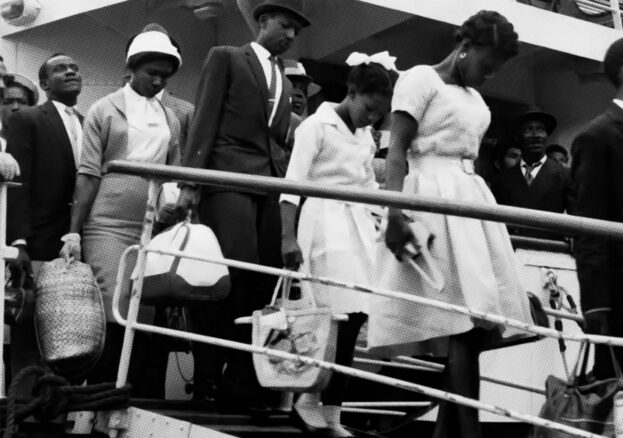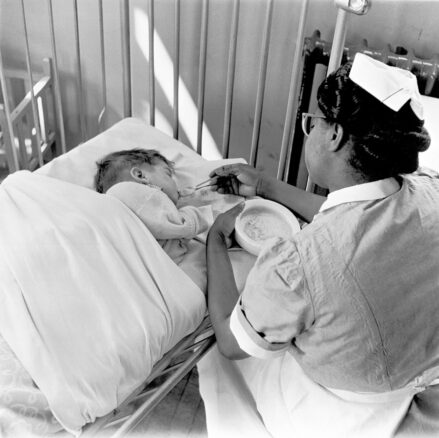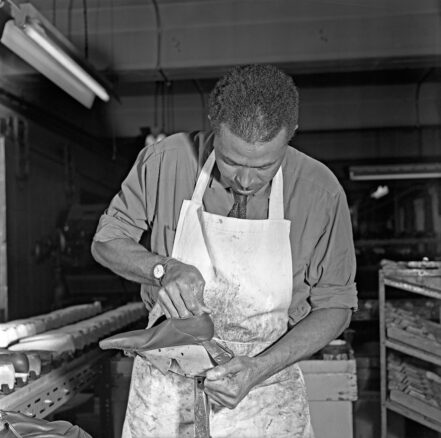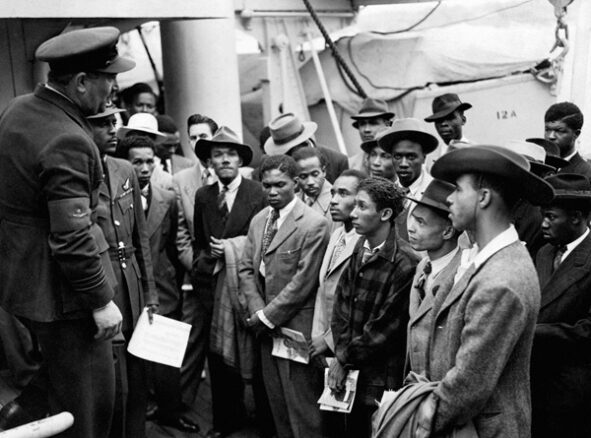
The story of the Windrush generation is the story of Britain itself. It is a story of call and response, of invitation and rejection, of building and breaking. It begins in the summer of 1948, when the Empire Windrush docked at Tilbury and men and women stepped off the gangway into a land they had been taught was home. They came with their Sunday best, their memories of the Caribbean sun, their children’s futures folded into their suitcases. They came with dignity, with a sense of duty, and with the quiet conviction that they belonged.
They had been told as much. Britain needed them. The Second World War had left factories empty, hospitals understaffed, buses without drivers. The promise was simple: help us rebuild, and you will share in the future you create. And so they came, not as strangers but as citizens of the Commonwealth, believing that the words of the Mother Country meant what they said.

What awaited them was not always welcome. Signs in windows that read “No Blacks, No Irish, No Dogs.” Cold streets where neighbours shut their doors. Jobs denied, houses refused, insults hurled. But through it all, they endured. They built lives in the face of hostility, formed churches, opened shops, raised families, and infused British life with new rhythms, new food, new culture. Their children became British in ways both ordinary and extraordinary: footballers, nurses, writers, teachers, activists. They were not outsiders. They were builders of modern Britain.
And yet, seventy years later, the promise was broken. The word Windrush, once a symbol of arrival and hope, became a byword for betrayal.
The scandal erupted in 2018, but its roots ran deeper. Laws passed decades earlier had slowly chipped away at the right to belong. Bureaucracy hardened into suspicion. The so-called “hostile environment” policy demanded paperwork that few possessed—birth certificates lost, old passports thrown away, decades-old records destroyed by the Home Office itself. The consequences were devastating. People denied life-saving medical care. Workers dismissed from their jobs. Pensioners left without support. Families torn apart. And in the cruellest cases, people who had lived in Britain since childhood deported to countries they barely remembered.
It was not an accident. It was policy. And it forced a reckoning. The Home Secretary resigned. The Prime Minister apologised. Reports were written, inquiries launched, promises made. A compensation scheme was established, meant to offer redress. But apologies without justice are only words, and the scheme itself quickly became another barrier. Complex forms, endless delays, derisory offers. Survivors were forced once again to prove their right to belong, to fight for recognition in the face of the same system that had wronged them.

The cruellest truth of all is that many never lived to see justice. At least sixty-four claimants have died before their compensation was paid, their final years clouded by uncertainty and indignity. Behind each number is a family left to fight on, grieving while battling bureaucracy, arranging funerals while still waiting for redress. Some families have received nothing at all, as claims for the deceased remain unresolved. Others speak of the bitter knowledge that their loved one died without the recognition they deserved. For them, the scheme has added another layer of trauma, another wound to carry. It has left children and grandchildren not only bereaved but disillusioned, convinced that the state is waiting for their stories to fade with time.
And why does the stalling continue? Part of the answer lies in the very design of the scheme. The process is labyrinthine, forcing people to gather evidence from half a century ago, as if lives lived in service to this country can be reduced to faded documents and scraps of proof. Those without lawyers are left adrift, because unlike other state redress schemes, there is no funded legal aid. As a result, those with legal help secure larger settlements, while those who struggle alone often receive only a fraction of what they are due. The scheme is housed within the Home Office, the same department that created the scandal, and so survivors see not compassion but the shadow of the hostile environment still alive in the paperwork. Even when reforms are proposed—partial payments for the elderly, faster reviews, trauma-informed processes—they are implemented slowly, if at all. Time ticks by. Lives end before justice is delivered.
So when we speak of Windrush, we are not speaking only of history. We are speaking of the present.
This year, Black History Month carries the theme “Standing Firm in Power and Pride.” It is a phrase that resonates with the Windrush generation. For what is their story if not one of standing firm? In the face of racism, they stood firm. In the face of bureaucracy and betrayal, they stood firm. They stood firm in their belief that they belonged, even when the country they helped to build turned them away.
To speak of power is to speak of their legacy. They did not simply survive; they transformed Britain. They made its hospitals function, its transport move, its culture sing. They gave Britain not only labour but imagination, creativity, resilience. To speak of pride is to recognise that, despite everything, they held their heads high. They raised children who became leaders, artists, campaigners, voices that continue to shape the nation.

But pride and power are not enough on their own. They must be matched by justice. And justice remains incomplete. The compensation scheme must be reformed—made faster, simpler, rooted in dignity rather than suspicion. Survivors must not be forced to relive their trauma on endless forms. Legal support must be funded, so that ordinary citizens are not left to battle alone. The government must embed Windrush into the national curriculum, so that every child understands what happened, and why it must never happen again.
Because Windrush is not only about those who came from the Caribbean. It is about what kind of country Britain wants to be. If the state can erase the rights of people who have lived here for half a century, then citizenship itself is fragile. If belonging can be withdrawn by policy, then none of us is safe. That is why Windrush matters to everyone.
There are warnings in the present. The shift towards digital-only visas, already criticised by campaigners, risks creating another Windrush—thousands of people suddenly unable to prove their right to stay because of systems they do not understand. The echoes are unmistakable. History does not repeat, but it rhymes.
And so we return to the theme: Standing Firm in Power and Pride. To stand firm is to refuse amnesia. Britain has a habit of forgetting its injustices, smoothing over the rough edges of its past. Windrush cannot be allowed to fade into the background. It must remain in the foreground, not as a wound to wallow in, but as a lesson to learn from. To stand in pride is to celebrate the contribution of the Windrush generation, to honour their labour and their culture, to see them not as victims but as architects of modern Britain. To stand in power is to demand that the state does more than apologise—it must act.
The Windrush generation showed Britain what loyalty looks like. They answered the call. They came when needed. They built a life out of little and gave much more than they received. They showed that belonging is not granted by government, but forged in daily life—in work, in community, in love of place. Their strength is the measure of Britain’s strength.
The scandal, however, showed us something else: that a country can betray its own, that racism can be embedded in policy, that dignity can be denied with the stroke of a pen. That is Britain’s contradiction. That is Britain’s unfinished business.
Black History Month gives us a space to hold both truths at once. To celebrate the power and pride of a people who stood firm, and to confront the betrayal that tried to break them. It is a call to remember, and also a call to act. Because the Windrush story is not closed. It continues in every survivor waiting for justice, in every child learning this history for the first time, in every demand that “never again” must finally mean something.
Windrush is Britain. Britain is Windrush. One cannot be told without the other. And until that truth is honoured in full—in law, in education, in justice—the promise remains unkept. The task for us, standing firm in this moment, is to make sure that the betrayal is never repeated, and that the pride and power of Windrush remain at the very centre of the nation’s story
Have you been affected by the Windrush scandal?
Are you or your family still waiting for justice? We’d like to hear your story.
Email us at windrushscandal@blackhistorymonth.org.uk
